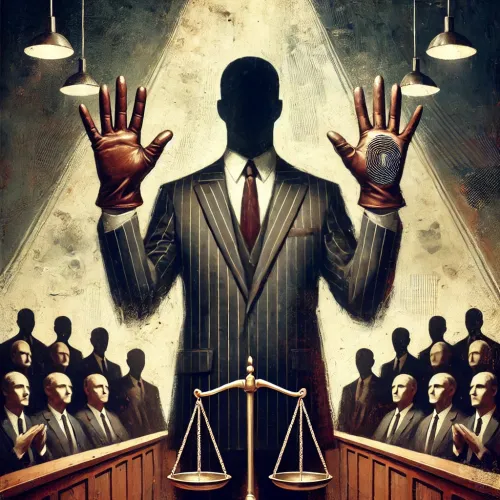Bushell’s Case arose in 1670 in England when William Penn, a Quaker preacher, and William Mead were charged with unlawful assembly under the Conventicle Act. The Act prohibited religious gatherings outside the Church of England. Penn and Mead conducted a public religious meeting that attracted a crowd, defying the law. The Crown sought to convict the two men swiftly to assert control over dissenting religious groups.
During the trial at the Old Bailey, jurors were instructed by the court to convict Penn and Mead. Despite overwhelming judicial pressure, the jury refused to return a guilty verdict. Instead, they acquitted the defendants of the most severe charges, convicting them only of assembly, which carried no criminal penalties.
Judicial Retaliation Against the Jury
Enraged by the jury's defiance, the trial judge fined and imprisoned the jurors, including Edward Bushell, for contempt of court. The judge argued that jurors had failed to follow instructions and render the "correct" verdict based on the law. This punitive action against the jurors highlighted the tension between judicial authority and jury independence, raising broader questions about the role of jurors in the legal system.
Appeal and Chief Justice Vaughan’s Decision
Edward Bushell appealed his imprisonment to the Court of Common Pleas. Chief Justice Vaughan presided over the case, issuing a groundbreaking ruling. Vaughan held that:
- Juror Independence: Jurors must be free to render verdicts based on their interpretation of the evidence and their conscience. They cannot be punished for returning a verdict that displeases the court or deviates from judicial instructions.
- Judicial Overreach: The court’s role is to guide the jury by presenting the law, but it cannot compel a particular verdict. Imposing penalties on jurors for their decisions undermines the integrity of the jury system.
- Protection Against Tyranny: Juror independence serves as a safeguard against governmental overreach and unjust laws. Without the protection of juror autonomy, courts could coerce verdicts to serve political ends, eroding public confidence in the justice system.
Chief Justice Vaughan declared the imprisonment of Bushell and his fellow jurors unlawful and ordered their release. This decision affirmed that jurors are immune from punishment for their verdicts, regardless of judicial dissatisfaction.
Impact on Jury Nullification
Bushell’s Case is widely regarded as a cornerstone of modern jury independence and nullification. The ruling established that:
- Juries Are Fact-Finders and Moral Arbiters: Juries have the dual role of evaluating evidence and considering the broader moral and social implications of their verdicts.
- No Retribution for Conscience-Based Decisions: By protecting jurors from punishment, the case ensured that they could act according to their conscience, even when their decisions conflict with legal statutes.
- Empowerment of Ordinary Citizens: The decision reinforced the principle that justice must reflect community values, entrusting citizens to act as a check on unjust laws and judicial overreach.
This precedent significantly influenced subsequent legal systems, including the American judicial system, where jury independence and nullification remain integral to the concept of a fair trial.
Historical and Modern Relevance
Bushell’s Case resonated during the colonial era in America, where juries often exercised their independence to resist oppressive British laws. For instance, in the 1735 trial of John Peter Zenger, an American jury acquitted Zenger of seditious libel despite judicial instructions to convict, citing the principles established in Bushell’s Case.
In modern times, the case continues to be a touchstone for debates about jury nullification. While courts often discourage jurors from considering the justice of a law, Bushell’s Case underscores their inherent right to do so. Advocacy groups, such as the Fully Informed Jury Association (FIJA), draw on this precedent to argue for juror education about nullification.
Critiques and Challenges
Despite its importance, the principles of Bushell’s Case raise ongoing challenges:
- Legal Uncertainty: Critics argue that allowing jurors to act on conscience rather than strict adherence to the law introduces unpredictability into the justice system.
- Potential for Bias: The freedom to disregard the law may lead to decisions based on personal prejudices, undermining the fairness of trials.
- Judicial Resistance: Courts have sought to limit the explicit use of nullification, as seen in cases like Sparf & Hansen v. United States (1895) and United States v. Dougherty (1972), reflecting concerns about its impact on the rule of law.
Bushell’s Case (1670) remains a foundational legal precedent affirming juror independence and the principle of nullification. By shielding jurors from judicial retaliation, it underscored the jury's role as a vital check on oppressive laws and governmental overreach. The case established that justice is not solely the domain of judges but a shared responsibility between the courts and the community. As a historical cornerstone of jury nullification, Bushell’s Case continues to influence contemporary legal systems, reminding us of the enduring importance of protecting individual conscience within the framework of justice.



